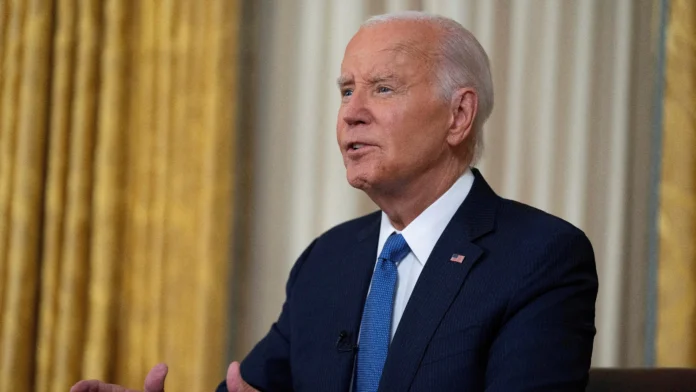A new political controversy has emerged in Washington, and it touches on one of the most sensitive topics in American life: the power of federal law enforcement. Senator Chuck Grassley of Iowa, one of the longest-serving Republicans in the Senate, revealed this week that the FBI, under President Joe Biden’s administration, expanded a secretive probe known as “Arctic Frost” to target dozens of conservative organizations.
According to Grassley, the investigation did not stop with President Donald Trump or his close allies. Instead, it spread much further, pulling in groups connected to the Republican Party and even youth-led movements like Charlie Kirk’s Turning Point USA. For many older Americans, who have lived through turbulent decades of political change, the news revives age-old concerns about government overreach, partisanship, and fairness in the justice system.
A Probe That Grew Beyond Its Original Mission
The operation in question, “Arctic Frost,” was initially launched as part of the FBI’s efforts to examine the fallout from the 2020 presidential election. Investigators were looking into claims of election interference and attempts to overturn the certified results.
But as Senator Grassley explained during a Senate Judiciary Committee hearing on Tuesday, the probe expanded well beyond its original purpose. What began as an electoral matter soon encompassed the Republican National Committee (RNC), the Republican Attorneys General Association, and nearly 100 individuals and groups with ties to the GOP.
“Arctic Frost was the FBI case opened and approved by anti-Trump FBI agent Timothy Thibault,” Grassley told his colleagues. “It became the foundation of Jack Smith’s elector case against citizen Trump, and now President Trump. But these new records reveal that Arctic Frost was much broader than just an electoral investigation.”
Grassley went on to accuse partisan actors within the FBI and the Justice Department of using the probe as a political weapon, targeting not just Trump but the Republican Party itself.
Ninety-Two Republican Targets
Perhaps the most startling detail from Grassley’s testimony was the scope of the operation. He claimed that no fewer than 92 Republican-linked individuals and organizations fell under the FBI’s investigative umbrella.
“This case was expanded to Republican organizations,” Grassley said. “The FBI sought to place under political investigation groups such as the Republican National Committee, the Republican Attorneys General Association, and various Trump-affiliated groups. Among them was Charlie Kirk’s Turning Point USA.”
Turning Point USA, founded in 2012, has become one of the most visible conservative youth movements in America, organizing campus events, training programs, and grassroots activism. Its inclusion in a federal probe instantly raised alarm bells for Republicans who see the group as a symbol of the next generation of conservative leadership.
Grassley argued that the expansion of Arctic Frost amounted to a wholesale investigation of “the entire Republican political apparatus,” a move he described as an abuse of federal power.
A Pattern of Political Investigations?
The Iowa senator did not stop with Arctic Frost. He linked the case to broader claims about how federal law enforcement has handled Republican figures in recent years.
Grassley pointed to the investigation and prosecution of Peter Navarro, a Trump White House economic adviser. According to Grassley, FBI agent Timothy Thibault celebrated privately when he learned the Biden Justice Department would move forward against Navarro. “When Thibault found out that Biden’s DOJ would prosecute Navarro, he said, ‘Wow, great.’ That’s a quote,” Grassley remarked.
To Grassley and fellow Republican Senator Ron Johnson of Wisconsin, these revelations illustrate a troubling pattern of political bias within institutions meant to operate above the partisan fray. Both senators have now made the Arctic Frost records public, insisting that Americans deserve to know how wide-reaching the FBI’s work has become.
The FBI’s Silence
As of now, the FBI has not commented on the latest allegations. The Bureau rarely speaks publicly about ongoing investigations, and officials often stress the importance of independence and impartiality in their work.
Yet the silence has only fueled speculation. Critics of the Biden administration argue that the lack of transparency makes it appear as though the Bureau has something to hide. Supporters counter that releasing details of sensitive investigations prematurely could compromise national security or ongoing legal cases.
This tension is hardly new. Older Americans will remember similar debates during the Watergate era, the Iran-Contra hearings, and even the controversies surrounding FBI Director J. Edgar Hoover decades ago. Each time, the same fundamental question arose: can the FBI be trusted to operate free from political influence?
What This Means for the Republican Party
For Republican leaders, the revelations about Arctic Frost could not have come at a more critical time. With elections looming, any perception that federal agencies are targeting conservative organizations could galvanize GOP voters. Already, figures like Charlie Kirk have taken to social media to decry the allegations as proof of “deep state” bias.
At the same time, the controversy presents risks. Democrats are likely to argue that Republicans are trying to shield themselves from legitimate investigations into election-related misconduct. By painting every probe as political, they say, GOP leaders undermine accountability.
For seniors who have seen many political storms over the decades, the debate may feel familiar: one side crying foul over government overreach, the other side insisting that justice must take its course.
A Nation Wrestling With Trust
Trust in American institutions has been steadily declining for years. Polls show that confidence in Congress, the media, and even churches has eroded, leaving many citizens skeptical of authority. The FBI, once viewed as one of the most respected agencies in the country, has not been immune to this trend.
The Arctic Frost controversy will likely intensify these doubts. If the public comes to believe that law enforcement is routinely used to target political opponents, the very foundation of democratic trust is shaken. For seniors, many of whom remember an era when the FBI’s reputation was almost untouchable, this represents a profound and unsettling shift.
Looking Ahead
The Senate investigation into Arctic Frost is far from over. Lawmakers on both sides of the aisle are pressing for more details, though their motives differ. Republicans want to expose what they see as partisan abuses, while Democrats are cautious about undermining active cases.
Much will depend on whether the FBI or the Justice Department choose to respond publicly. A statement clarifying the scope and purpose of Arctic Frost could ease concerns—or inflame them further, depending on the details.
For now, the story remains one of accusation and counter-accusation, with ordinary Americans left to sort out whom they believe.
The revelation that the FBI’s Arctic Frost probe extended to 92 Republican groups and individuals is a dramatic twist in the ongoing saga of American politics. To supporters of President Biden, it may look like a necessary step in safeguarding democracy. To critics, it appears to be yet another example of partisan overreach from institutions meant to remain neutral.
For older Americans, who have seen the pendulum of politics swing back and forth countless times, the controversy is a reminder of how fragile public trust can be—and how important it is to demand accountability from those in power, no matter which party holds the White House.
As the Senate continues its investigation and the FBI remains silent, one thing is certain: the Arctic Frost probe will remain a central talking point in America’s political debates for months to come.



